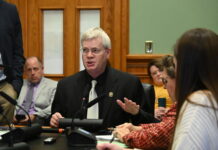In the fourth week of the legislative session, we continued working in subcommittees, where every bill begins with input from the public. The use of electronic means to include people from across Iowa seems to be working well. We also moved several of the ideas that made it through subcommittee to their full committees, where more legislators take a look at an issue and there is an opportunity to amend, reject or pass each idea. Finally, we have more bills eligible for floor debate, where the entire Senate gets to hear arguments on both sides of each bill and decide if it should be sent to the House of Representatives for consideration.
One of the bills we passed this week was Senate File 231, which would allow a young person with a special minor’s driver’s permit to help transport motor vehicles from farm to farm. The permit is limited to teenagers living or working on a farm operating between 5 a.m. and 10 p.m. Currently, these teenagers can drive a tractor or combine between farms, but cannot drive a pickup between farms. I know that when I was a teenager, I’d much rather drive a pickup down the road behind a combine than be in the combine dealing with traffic. This legislation makes sense to me and should make life a little easier for hard-working farm families.
K-12 funding has been proposed at an increase of $45.2 million dollars for next year. Much of state funding is connected to the number of students enrolled in the district. Because of the coronavirus, K-12 enrolment decreased by around 6,000 students since last year. Some families chose to keep their students home because of health concerns or frustration with inconsistency and uncertainty surrounding school schedules this year.
Increasing state aid in order to make up for the decrease in enrollment does not make sense this year since it would skew numbers that could change significantly next year. So SSB 1159 provides a one-time increase of $65 per pupil on top of the regular increase in State Supplemental Aid. Another nearly $10 million goes to equalizing per pupil and transportation inequities.
This proposal to increase funding of public schools by $45.2 million helps schools during these uncertain times and allows the state to make promises for funding that it can keep next fall.
As we move along with vaccinations for Covid-19 I have heard from many who are eagerly awaiting their opportunity to receive this vaccine. I also hear from those that have concerns over this vaccine so quickly rushed to the public. This last week I filed SF 193 which would prohibit government or employers from mandating a covid-19 vaccine for employees or students. A person could not be discriminated against because they do or do not get the vaccination. This would include insurance companies not being able to discriminate on this basis.
When I shared this with a community college student government body, I had a student ask how this would enable us to end the pandemic. I reminded him that this is not the first health challenge that we have faced and none of those in the past were ended with such a mandate. The instructor contacted me the next day remarking at the discussion they had after meeting with me. He was surprised at how universal the support was for mandated vaccination, yet how little they knew about the risks or potential rewards. This gave him the opportunity to discuss self-government and having input into the laws and rules that we must obey. They were encouraged to think for themselves rather than just follow the herd.
That is always my goal, especially when I have the opportunity to talk to young people. I want Iowans to understand that the First Amendment to the U.S. Constitution was written to secure freedom from government coercion. That is the foundation of our system of government. It has resulted in the most liberty and prosperity for its citizens that the world has ever known.












